An official website of the United States government
 United States Department of Labor
United States Department of Labor
In 2012, there were 19 major strikes and lockouts involving 1,000 or more workers and lasting at least one shift. The 19 major work stoppages beginning in 2012 equaled the total from 2011. There were 1.13 million days idle from major work stoppages in effect in 2012, also higher than 2011 with 1.02 million days idle.

| Year | Number of work stoppages | Workdays idle from major work stoppages |
|---|---|---|
2002 | 19 | 660,000 |
2003 | 14 | 4,091,000 |
2004 | 17 | 3,344,000 |
2005 | 22 | 1,736,000 |
2006 | 20 | 2,688,000 |
2007 | 21 | 1,265,000 |
2008 | 15 | 1,954,000 |
2009 | 5 | 124,000 |
2010 | 11 | 302,000 |
2011 | 19 | 1,020,000 |
2012 | 19 | 1,131,000 |
NOTE: The term "major work stoppage" includes both worker-initiated strikes and employer-initiated lockouts that involve 1,000 workers or more and lasting at least one shift. BLS does not distinguish between lockouts and strikes in its statistics. | ||
Over 40 percent (8 of 19) of major work stoppages beginning in 2012 occurred in November and December.
The largest work stoppage beginning in 2012 in terms of number of workers and total days idle was between the Chicago Public Schools and the Chicago Teachers Union. The longest work stoppage beginning in 2012 was between Lockheed Martin Corporation and the International Association of Machinists, Local 776.
These data are from the Work Stoppages program. Annual data are not seasonally adjusted. To learn more, see "Major Work Stoppages in 2012," (HTML) (PDF), news release USDL-13-0193. The major work stoppages series dates back to 1947. The term "major work stoppages" includes both worker-initiated strikes and employer-initiated lockouts that involve 1,000 or more workers and last at least one shift. BLS does not distinguish between lockouts and strikes in its statistics.
Bureau of Labor Statistics, U.S. Department of Labor, The Economics Daily, 19 major work stoppages and 1.1 million days idle in 2012 at https://www.bls.gov/opub/ted/2013/ted_20130211.htm (visited February 22, 2026).

